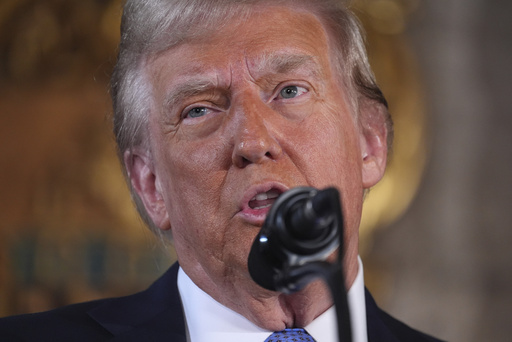WEST PALM BEACH, Fla. — President-elect Donald Trump on Friday included the 27 nations of the European Union in his list of trade partners that may face tariffs unless they increase their imports of American goods.
Trump took to social media just after 1 a.m. to assert, “I told the European Union that they must make up their tremendous deficit with the United States by the large scale purchase of our oil and gas. Otherwise, it is TARIFFS all the way!!!”
In the year 2023, the United States recorded a trade deficit of $209 billion with the EU, as indicated by data from the Census Bureau. Total imports from Europe reached $576 billion, while exports from the U.S. were at $367 billion.
Questions seeking further insight into Trump’s comments went unanswered by his transition team, leaving uncertainty around the potential next steps. While Trump previously imposed a 25% tariff threat on Canada and Mexico in November, those countries’ leaders quickly engaged with him in hopes of finding a resolution. Conversely, the European Union does not have a central authority to make purchasing commitments for natural gas and oil on behalf of its 27 member states, complicating the situation further.
A spokesperson for the EU Commission, Olof Gill, responded to Trump’s announcement, stating that they were open to discussions with Trump about enhancing the existing strong relationship, particularly regarding mutual interests in the energy sector. He pointed out that the EU is already in the process of reducing its energy imports from Russia and diversifying its energy sources. However, he withheld further details, emphasizing that the new administration is yet to take office.
Scott Lincicome, a vice president at the Cato Institute, noted the challenge in interpreting Trump’s messaging related to European trade, as natural gas exports to Europe had already increased in response to Russia’s invasion of Ukraine in 2022. “We really need to understand this as Trump setting the stage for future negotiations,” Lincicome stated. “For better or worse, expect more of this approach in the coming four years.”
The $209 billion trade deficit, however, masks a more complex dynamic beneath the surface. For instance, German carmaker BMW sources parts for assembly at its South Carolina factory, illustrating how intra-company goods movements can impact trade totals.
According to the U.S. Energy Information Administration, over half of the liquefied natural gas (LNG) imported by the EU and the UK in 2023 originated from the United States. LNG exports to the EU and UK have surged threefold since 2021.
On Tuesday, Energy Secretary Jennifer Granholm referenced a new study indicating that unrestricted LNG exports could drive up domestic prices and increase carbon emissions. Trump’s previous campaign emphasized that boosting oil and natural gas production would help alleviate the frustration of U.S. voters still reeling from an inflation spike in 2022.
Trump’s demands for Europe to boost its imports of oil and natural gas aren’t entirely new. During his first presidency, he pushed for similar actions, leading to a 2018 agreement with then-European Commission President Jean-Claude Juncker to enhance LNG exports to Europe.
However, as highlighted by the University of Pennsylvania’s Kleinman Center for Energy Policy, there are limitations. The U.S. cannot compel companies to ship goods to specific regions or countries, and the EU cannot enforce its member states to procure American fossil fuels.


